How to Cook a Eye Round Roas Beef Med Rare T in a Crock Pot
This Eye of Round Roast Beef recipe is affordable, so easy and totally foolproof to prepare! It's generously slathered with a delicious herb butter on the outside, tender and juicy on the inside, roasted with rich mushrooms and finished with a luscious gravy! This roast dinner has it all and it's perfect for everything from casual Sunday dinners to special holiday meals!
This steakhouse-style beef roast pairs beautifully with everything from sweet potatoes, stuffing and spinach casserole to french fries and onion rings! Continue to read on for simple tips and helpful tricks for preparing the perfect roast beef every single time! And, don't miss the step by step photos at the bottom of the post!
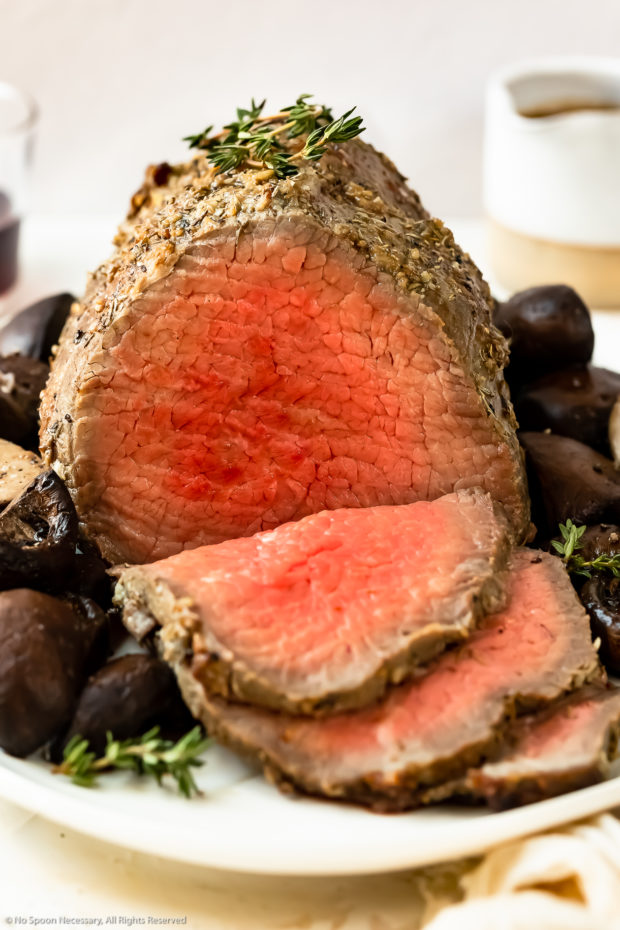
Because, you can't properly celebrate the holidays without a show-stopping, extra-special roast of some kind!
While roast beef may sound fancy and look complicated to prepare, it's actually remarkably simple! All you need is this foolproof recipe, a decent piece of meat, fresh mushrooms (optional) and a few pantry staples to prepare a roast that will blow your mind!
Quick Navigation - Table of Contents
Eye of round roast beef: recipe overview
A great roast beef is a culinary classic for a good reason! And, this eye of round roast is most definitely something special!
This recipe features an economical cut of beef and lovingly smothers and covers it in a delicious herb compound butter. It's slowly roasted in the oven to produce a richly golden, tender and juicy hunk of beef that's beautifully pink from edge to edge! Served with earthy, meaty mushrooms and finished with a silky, luscious red wine gravy, this beef roast is a savory, decadent delight the entire family will love!
Bonus points – this roast is incredibly budget friendly and easily feeds a crowd! Plus this recipe is very simple to prepare and everything is all made in just one roasting pan – from the beef and mushrooms, right down to the gravy!! You start the roast at a high temperature in the oven to get a richly browned outside, and then reduce the oven temperature to cook the beef low and slow. This slow roasting method is not just incredibly easy, it also prevents the gristle from getting too tough and produces a juicy, flavorful roast beef dinner!
What is eye of round roast beef?
Eye of round roast, also known asround eye pot roast, is an economical, lean and flavorful boneless roast that looks similar to a beef tenderloin. The eye of round can be sold as a whole roast, cut into steaks, or as ground beef.
While this cut of beef is most often used for roast beef, it's extremely versatile – see below!
What's an eye of round good for?
- Whole roast is good for slow-roasting (roast beef), braising, slow-cooking, pressure-cooking, sous-vide and poaching!
- Steaks cut from the roast are great for marinating, stews or can be processed into cube steaks for chicken fried steak.
- Ground beef from the eye of round is great for stir-fries!
Where is eye of round on cow?
The round is a primal cut that comes from the hind legs of the beef steer or heifer, between the rump and hind shank. The eye of round is a roast cut from the elongated muscled located in the center of the round, thus the name "eye of round".
The muscles in this rear leg area of the cow are used for movement; therefore, the beef is lean, but tough. It requires low and slow cooking or moist heat to become tender.
Where to buy eye of round roast?
Most major grocery stores and supermarkets carry eye of round roasts. You can find them located in the meat aisle with the other cuts of beef, or you can request one from the butcher at the meat counter.
Is eye of round roast expensive?
Eye of round, along with bottom round roasts and other cuts perfect for roast beef, are inexpensive and extremely economical!
The average cost of a roast will greatly depend upon where you live. A USDA Select Angus Beef Eye of Round Roast is between $3-4 dollars per pound, while USDA Choice ranges from $6-7 and USDA Prime ranges from $9-12. (The prices listed here are for North Carolina.)
Beef grades
Beef is graded by quality for tenderness, juiciness and flavor, as well as yield of usable lean meat.
- Prime Beef: The highest quality from young, well-fed beef cattle. Prime beef has abundant marbling throughout the lean meat. This grade of beef is generally sold in hotels and restaurants.
- Choice Beef: High quality beef, but with less marbling than Prime. This grade is still very tender, juicy, and flavorful.
- Select Beef: Leaner, with less marbling than the higher grades of beef. This grade is uniform in quality and fairly tender; however, it lacks some of the juiciness and flavor found in Prime.
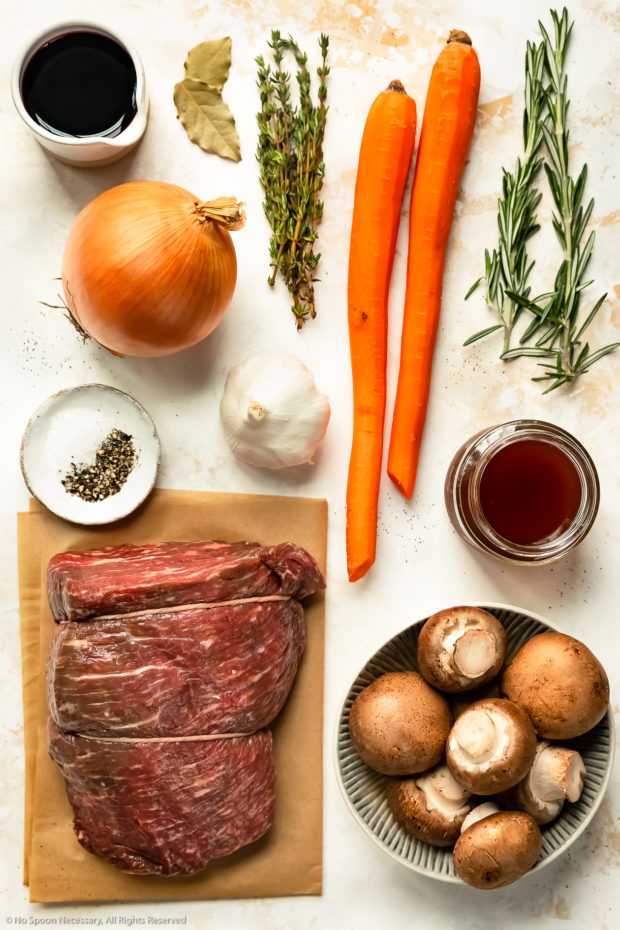
What cut of beef is the most tender?
The wide variety of cuts of beef roasts at the grocery store can be overwhelming, and confusing if you don't understand the labels. The following beef roasts are the best cuts for preparing classic tender roast beef.
- Eye of Round Roast: Cut from the very lean and active round primal. This roast packs tons of beefy flavor and no fat. It's incredibly easy to prepare and requires low and slow cooking for maximum tenderness and flavor. It's best when cooked to rare or medium-rare and sliced thin against the grain.
- Bottom Round Roast: Lean cut from the round primal. It needs low and slow cooking for maximum tenderness and flavor. This cut is great for making roast beef, as well as pot roasts and cube steaks.
- Top Sirloin Roast: This versatile roast is cut from the top sirloin. It's lean and tender with good marbling throughout.
- Sirloin Tip:A lean cut from the bottom sirloin, also known asCrescent Roast, Knuckleand Round Tip Roast. This cut is economical and best when carved thin. The sirloin tip is often used for Philly Cheesesteaks.
- Top Round Roast: Also known asTop Round Pot Roast, this is a popular cut for roast beef; however, it's also great for London Broil, Swiss Steaks and Scaloppini. It's economical, moderately tender and full-flavored.
How to cook eye of round roast?
This easy low and slow cooking technique of making roast beef with turn an economical eye of round into the juiciest, most flavorful and tender roast! It's a simple and straightforward roast, but you have to cook it properly! Follow the below easy steps to create a better than restaurant-quality roast in your very own kitchen!
(Don't forget to scroll down for the detailed instructions in the complete printable recipe at the bottom of the page.)
How to make roast beef in the oven
- Bring beef to room temperature + salt: Remove the beef from the refrigerator at least 1 ½ and up to 2 hours before cooking to bring to room temperature. Generously season all sides of the beef with salt, using your hands to rub it into the beef. Set aside.
- Make compound butter:In a medium bowl, combine the butter, garlic, fresh herbs, salt and pepper.
-
Preheat oven: Preheat oven to 500°F.
-
Dry beef & smear with butter: Gently pat beef dry with paper towels. Spread some of the butter evenly over one side of the beef.
- Prepare roasting pan:Add the onions, carrots and garlic to the bottom of a roasting pan to create a bed.
- Add beef: Place the beef, butter side down on top of the vegetables. Spread more butter evenly on top of the beef.
- Brown: Roast for 10 minutes. Remove from oven and reduce temperature to 225°F.
- Add herbs and remaining butter: Add the herbs to the roasting pan. Carefully dollop the remaining butter evenly on top of the beef.
-
Slow Roast: Slow roast the beef for 30 minutes.
-
Season mushrooms:Place the mushrooms in a bowl. Drizzle with oil and season with salt and pepper. Toss to coat.
- Add mushrooms: Remove the pan from the oven and add the mushrooms. Return to oven and continue to roast for an additional 40 to 60 minutes, or until the internal temperature is 115-118 degrees for medium-rare.
- Rest: Remove the beef and mushrooms from the pan and transfer to a cutting board. Tent lightly with foil and let rest for 20+ minutes.
- Make the gravy: Remove and discard the vegetables from the pan. Prepare the gravy according to recipe instructions.
- Serve: Thinly slice the beef against the grain. Serve with mushrooms and drizzle with gravy. Enjoy!
How to roast beef step-by-step photos
(Please scroll down for the detailed instructions in the complete printable recipe card at the bottom of the page!)
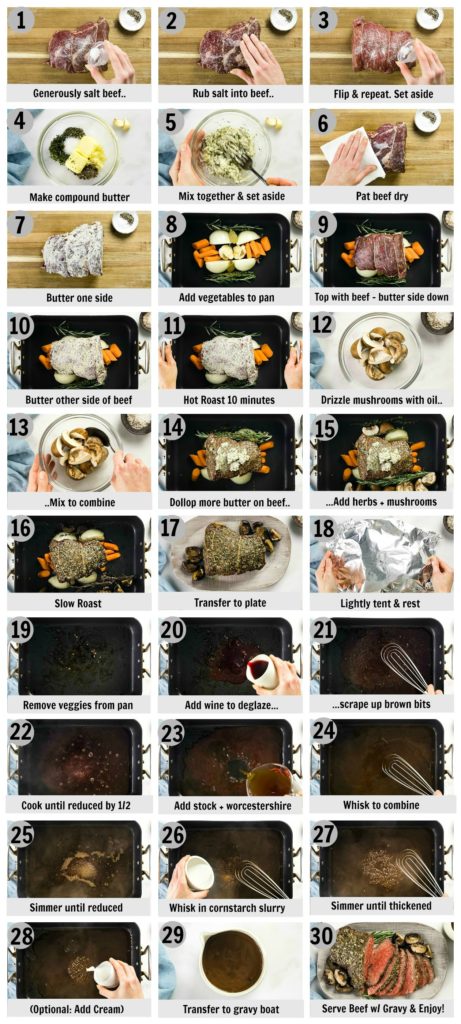
Beef roast: FAQ
When is roast beef done?
The exact cooking times and internal temperatures for roast beef will vary depending upon the size, shape and grade of beef, as well as your desired degree of doneness. You should always test for doneness using an instant read thermometer or meat thermometer. Internal temperature is accurate and unwavering; it's the only way to guarantee that your meat is properly cooked to your desired doneness.
How do you check the internal temperature of beef?
Make sure you insert the thermometer through the side of the beef into the thickest portion of the center of the meat, avoiding any fat and bone. If your beef roast is irregularly shaped, check the temperature in several places and use thelowest internal temperature, as that's the most accurate temperature for the core of the beef.
Pro-tip: Remove the roast from the oven BEFORE it reaches your desired degree of doneness – when the thermometer is 8-10°F lower than your desired doneness. The internal temperature of the roast will continue to rise by about 8-10°F while it's resting. (See the temperatures listed in parentheses below for guidance.)
Roasting temperatures and degrees of doneness
- Extra-Rare (also known as blue or bleu): 100-115 °F – Roast is deep red in color and barely warm. The beef will feel soft and squishy to the touch. (Remove from oven when roast is at 95-98 degrees.)
- Rare: 120-125 °F – Center of roast is bright red with a slightly pinkish exterior portion and just warm throughout. Beef will feel soft to the touch. (Remove from oven when it's 115-118 degrees.)
- Medium Rare: 130-135 °F – Center is very pink and turns slightly brown towards the exterior; roast is slightly hot throughout. Beef will ever so slightly yield to the touch. (Remove from oven when it's 125-128 degrees.)
- Medium: 140-145 °F – Roast is hot throughout with a light pink center and brown outer portion. Beef will slightly yield to the touch. (Remove from oven when it's 135-138 degrees.)
- Medium -Well: 150-155 °F – Roast is hot and mostly grayish brown throughout with the slightest hint of pink in the center. Beef will feel firm to the touch. (Remove from oven when it's 145-148 degrees.)
- Well Done: 160-165 °F – Roast is uniformly brownish gray throughout with little to no pink. Beef will feel very firm to the touch. (Remove from oven it's 155-158 degrees.)
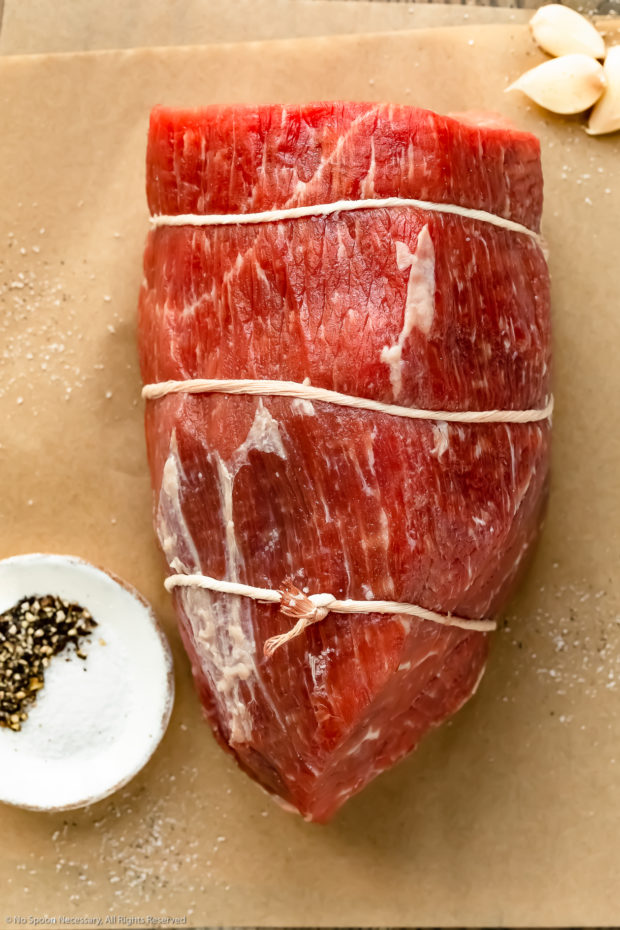
How to cut roast beef?
The way you carve roast beef will affect how chewy or tender the slices of beef are. All roast beefs are made from tough cuts of meat and the secret to tender roast beef lies in how you slice it. You should always slice any roast (beef, turkey, pork, etc.)against the grain. Slicing a roast incorrectly (with the grain) will result in chewy beef instead of melt-in-your-mouth tender beef.
General tips and tricks for slicing roast beef
- Rest the beef before slicing. Resting the beef is important! Resting allows the natural juices to settle and produces beef that is more tender. If you cut into the roast too soon it will lose its juices and become dry. A roast beef should be allowed to rest for at least 20 minutes before carving – use aluminum foil to lightly tent the meat and hold in the heat.
- Place beef on a cutting board. Don't try slicing beef inside the roasting pan. Transferring the rested beef to a clean cutting board makes the job much easier!
- Use a sharp knife. In order to properly carve beef, you must use a sharp knife! A dull knife will produce tough slices of beef. Use a flat blade (not a serrated) – a chef's knife or slicer work best.
- Utilize a meat fork. A meat fork makes easy work out of carving as it will easily hold the roast in place during the slicing process.
- Slice against the grain. Always carve beef against the grain. Slicing beef against the grain results in more tender, juicy meat.(See below for locating the grain in meat.)
- Cut at a diagonal in a smooth motion. Gently glide your knife smoothly across and through the beef at a diagonal angle, sliding the blade of the knife away from you and the roast. A diagonal motion will ensure you get even slices of beef, while a clean-cut will help retain all the moisture in the beef.
- Slice as thin as possible. The thickness of the slice of beef is important. Since the muscle fibers run parallel to each other, cutting thick slices will still leave a significant amount of tough muscle. You should try to slice as thin as possible; however, tender cuts of beef may be more difficult to slice very thinly across the grain as they may fall apart. Aim to carve tender cuts into slices that are approximately ½-inch thick and tougher cuts into slices that are no more than ¼-inch thick.
Why slice against the grain?
You have probably read in recipes or heard celebrity chef's say time and time again that you should slice meat "against the grain". But you may have wondered 'what does that mean' and 'why'?
You need to slice beef against the grain, so you don't ruin the roast! All roasts are made of active muscles which consist of fiber and a lot of connective tissue. In order for the beef to be edible and tender, you must cut through the fibers and shorten them. Cutting against the direction of the grain breaks up most of the muscle fibers, making the beef much easier to chew.
How do you know which way the grain runs in beef?
The grain refers to the direction that the long strands of muscle fibers run in your cut of meat. The muscle fibers in beef always run parallel to each other. The grain of meat is clearly defined and easier to identify if tougher cuts of meat, such as eye of round roasts, briskets and flank steaks.
To locate the grain, locate the direction of the "lines" or fibers in the meat. Once you have pinpointed the path of the lines, hold your sharp knifeperpendicular to them and begin slicing. Continue slicing perpendicular, or across, all the "lines" in the beef.

Why is my eye of round roast tough?
Large cuts of beef, such as eye of round, can be intimidating to home cooks. However, it's easy to avoid your roast beef turning out tough by avoiding these common mistakes!
Common mistakes when cooking a large cut of beef:
- Your roast wasn't room temperature. Lean and tough cuts of beef, such as eye of round, don't have a lot of fat, thus they're less forgiving if even slightly overcooked. You must let the beef sit at room temperature for atleast 45 minutes to 1 hour before cooking to ensure it cooks more evenly.
- You didn't season with salt in advance. Generously seasoning your roast an hour or two before cooking gives the salt a chance to permeate the roasts interior and absorb into the meat, which results in juicer, more flavorful beef.
- Too high of heat. A roast that is cooked too fast at too high of a heat will be tough. All roasts require low and slow heat! Low and low cooking allows the collagen to melt and the tough muscle fibers to separate, which creates a beautiful, tender mouthfeel. If you cook a roast quickly at high heat the collagen and fibers in the beef will contract, causing moisture to squeeze out of the beef.
- Undercooking. Undercooking your roast will cause the meat to be very chewy and not palatable!
- Overcooking. Similar to the above, overcooking a roast will make your beef very dry and unappetizing.
- Not resting the meat.Even if you cook your beef perfectly, it will turn out dry, tough and inedible if you don't let it rest. Resting the beef allows the juices to redistribute within the meat, instead of spilling out onto the cutting board.
- Slicing beef the wrong way. If you slice parallel (with) the muscle fibers (the grain), you will end up needing to use your teeth to chew through them. Carving your roast against the grain allows your knife to do all the hard work!

What to serve with roast beef?
This tender, juicy roast pairs well with a wide variety of side dishes! It's a versatile main that works well for various occasions from Sunday dinner to holiday entertaining!
Below are a few tasty side dishes that even the pickiest eaters in your family will love!
14 easy side dishes to serve with beef
- Bread: Rolls or biscuits are perfect for sopping up the roast juices or creamy gravy!
- Yorkshire Pudding: Rich and savory Yorkshire pudding is a perfect pairing for classic roast beef with gravy!
- Cranberry Relish: Sweet and tangy homemade cranberry sauce is an easy and light option that feels totally fancy!
- Wild Rice Salad: Nutty wild rice salad is a delicious match for savory roasts!
- Mushrooms: Earthy mushrooms perfectly complement the hearty richness of this roast beef.
- Carrots: Sweet carrots tossed in a delicious glaze is a beautiful contrast to beef!
- Asparagus: Crisp oven roasted asparagus is a great way to add a pop of color!
- Potatoes: Whether it's roast potatoes, baked potatoes, mashed potatoes or potatoes au gratin, there's nothing more classic than the combination of beef and potatoes!
- Sweet Potatoes: See above – any potato is a good idea!
- Brussels Sprouts: Tender, crisp brussels sprouts are a personal favorite in my family!
- Green Beans:Green beans are an easy staple for a good reason! Try green beans with bacon or pancetta for a savory twist!
- Mac and Cheese: Tender macaroni swimming in rich cheese sauce is always a winner! Try adding lobster to your mac and cheese for an adult affair!
- Stuffing: Festive stuffing is an obvious choice if you are serving this roast for the holidays!
- Spinach Casserole: Creamy, decadent spinach casserole is a must if you are looking for a steakhouse experience!
What to do with leftovers?
Leftovers are arguably the best part of any good meal; however, cold slices of beef can get boring after a few days. But, don't throw those leftovers away! Instead, repurpose them and transform your roast beef leftovers into a number of fast and easy weeknight meals!
12 ways to use leftover beef roast
- Hash: Chop up your leftover roast beef and use it in a delicious breakfast hash with plenty of potatoes, onions, garlic and fresh black pepper!
- Breakfast Sandwich:Prepare eggs to your liking (scramble, sunny-side-up, poach, etc.) and layer them with beef and cheese on an English muffin or onion bun!
- Couscous Salad:Give your lunchbox salad a delicious upgrade! Toss arugula with couscous, chickpeas, your favorite vegetables and leftover beef!
- Sliders: Stuff slider buns with leftover beef, caramelized onions and provolone! Bake the sliders until the cheese melts and enjoy with a bit of gravy or au jus!
- Sandwich: Make a classic Philly cheesesteak or a traditional French dip sandwich!
- Quesadilla: Never underestimate the deliciousness of a beef quesadilla with plenty of onions, peppers and cheese!
- Enchiladas: Substitute chicken for leftover roast beef for a fun twist on your standard enchiladas!
- Fajita:Sauté a few peppers and onions and make easy homemade beef fajitas!
- Poutine:Top warm, crispy French fries with plenty of leftover beef and a decadent cheese sauce!
- Pizza:Forget pepperoni – try a homemade cheesesteak-style pizza!
- Stroganoff: Toss leftover beef with egg noodles and a sour cream sauce for easy beef stroganoff!
- Easy Stir-Fry:Stir-fry your favorite fresh vegetables with teriyaki sauce and toss in the beef to warm just before serving!

Tips for storing and freezing eye of round roast beef
Got leftovers? Read below for tips on safely storing them in the refrigerator or freezer to enjoy at a later date!
How to store homemade roast beef?
Start by allowing your beef to cool to room temperature. Wrap the entire roast beef in foil or plastic wrap. Next, place the wrapped beef into an airtight container or a heavy-duty freezer bag.
Pro-tip: Store leftover roast beef whole in the refrigerator overnight and slice it thin the next day for future use. Cold beef slices much easier than warm!
How long will cooked roast beef keep?
Properly stored, a homemade roast will last for3-4 days in the refrigerator. To further extend the shelf life of roast beef, freeze it! (See below for freezing instructions.)
Can you freeze roast beef after cooking?
This beef roast freezes beautifully! I like to plan for leftovers that way I can stock my freezer for quick weeknight dinners! However, there are a few easy tricks to follow to prevent freezer burn and help your beef retain moisture in the freezer!
How to freeze meat
- Slice the meat thin. Cut the roast as thinly as possible with a sharp Chef's knife or slicer.(See section above on 'how to cut beef'.)
- Fan the meat out. Once thinly cut, slightly fan the meat out – partially overlapping each piece. Envision prosciutto or smoked salmon at the grocery store – that's how you want to stack the beef.
- Pack it. Transfer the beef, ensuring it's packed flat, into a freezer-safe storage bag.
- Remove air. Squeeze all the excess air out of the bag before sealing it shut.
- Flash freeze. Place the bag(s) on an aluminum cookie sheet and transfer the baking sheet to the freezer. Flash freeze until the beef is solid.
- Store it. Remove the bags from the cookie sheet and store the beef in the freezer for up to 6 months.
How to defrost beef?
When you are ready to enjoy your sliced roast beef leftovers from the freezer, remove the bags of roast beef from the freezer. Place the bags of beef on an aluminum baking sheet on the kitchen counter. Defrost (on the aluminum baking sheet) at room temperature for 20-30 minutes. Use and enjoy!
Pro-tip: Aluminum is a wonderful conductor of heat! It will help significantly cut down on the defrosting time!!
Can roast beef be reheated?
While it can be difficult to reheat a roast without overcooking it and causing it to become well done, it's not impossible! Follow these easy methods to reheat your roast beef!
How to reheat eye of round beef roast
- Reheating a whole roast: Preheat the oven to 250 degrees F. Place your leftover roast on a sheet of heavy-duty aluminum foil (the foil must be large enough to wrap the entire beef). Generously spoon a bit of gravy or pan juices over the top of the roast. Bring the sides of the aluminum up-and-over the beef. Crimp the edges of the foil to seal, creating an airtight packet and place the roast on an aluminum baking sheet. Turn the oven off and place the roast in the oven. Reheat the beef until it'sjust warm through!Tip:Once reheated, your roast will go up one level of doneness. For example, if your roast was rare, it will end up medium-rare after reheating.Warning:Do not reheat a roast larger than one pound. If necessary, cut a large roast into 2 smaller pieces of meat.
- Reheating slices of beef roast: Preheat oven to 250 degrees F. Place thin slices of roast beef in a stack to form a pile about ¾-inch to no more than 1-inch thick. Place the stack of beef on a large sheet of aluminum foil. Generously spoon a bit of gravy or pan juices over the top of the beef. Bring the sides of the foil up-and-over the beef and wrap tightly to form a packet. Place the stack of beef on an aluminum baking sheet. Turn the oven off and reheat until the slices arejust warm throughout, about 8-10 minutes.Note: The top and bottom slices of beef will be close to well done, but the middle slices will only go up one level of doneness.
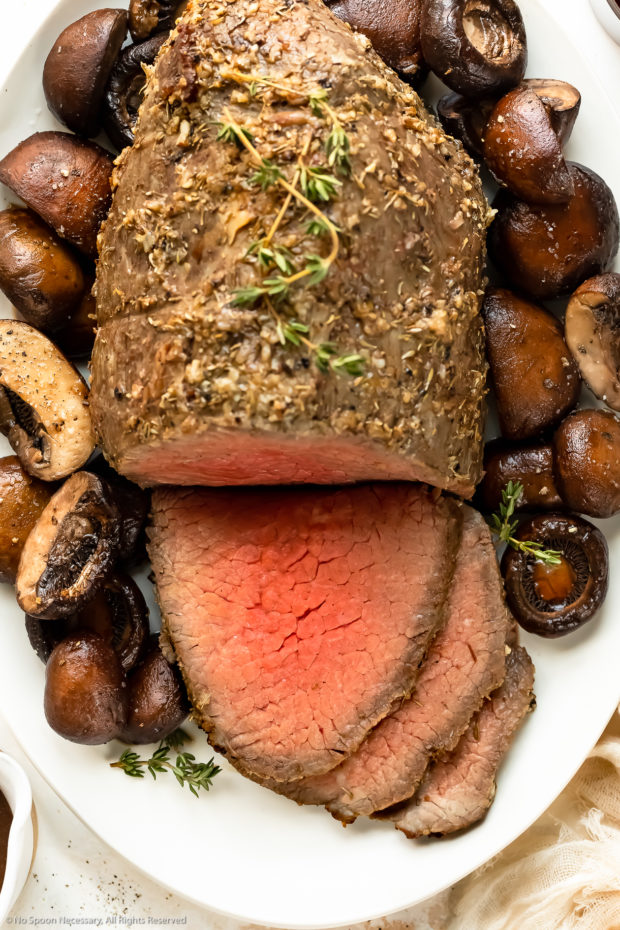
Recipe testimonials – What people are saying about this recipe
Here's what readers are saying about this delicious roast of beef recipe!
- "I made this exactly as written, temped to medium and sliced thin, and it was fantastic!! My husband is a chef and he said it was "better than restaurant quality." This recipe is definitely a keeper!!" –Kelly
- "Turned out absolutely perfect. The whole family couldn't get enough!" –Lynn
- "Outstanding, tender succulent roast and the gravy is insanely good!" –Cynthia
- "Thank you for detailed and clear directions! It did turned out better than prime rib I made couple weeks ago, believe it or not. Needed 70 min in low heat for med rare. It is foolproof. Printing out recipe, search is over!" –Kristine
Craving MORE? Follow all the deliciousness on Facebook, Pinterest and Instagram!
Looking for more easy show-stopping entrees?
If you love this roast of beef, try one of these delicious recipes next:
Thanksgiving Turkey Breast Roulade with Stuffing
Short Rib Ragu Bolognese
Easy Carolina Pulled Pork Recipe
Easy Jerk Pork Recipe
The best eye of round beef roast recipe 👇
Eye of Round Roast Beef recipe
This Eye of Round Roast Beef recipe is affordable, so easy and totally foolproof to prepare! It's generously slathered with a delicious herb butter on the outside, tender and juicy on the inside, roasted with rich mushrooms and finished with a luscious gravy! This roast has it all and it's perfect for everything from casual Sunday dinners to special holiday meals!
Recipe can be scaled up or down by using the slider if you hover your mouse over the number of Servings.
Servings: 8
Calories: 486 kcal
-
Mixing bowls (2)
-
Roasting Pan
- 3 to 3 ½ pounds Boneless Eye of Round Roast
- Kosher Salt & Freshly Cracked Black Pepper
- 8 TBS Unsalted Butter – softened
- 5 cloves Garlic – softened
- 1 tsp Finely Chopped Fresh Rosemary (or ½ tsp Dried)
- 2 tsp Chopped Fresh Thyme (or 1 tsp Dried)
- 1 Yellow Onion – peeled & quartered through root
- 2 large Carrots – peeled & cut into 2-inch chunks
- 1 head Garlic – loose skin removed & halved through root
- 2 Bay Leaves
- 4 sprigs Fresh Thyme
- 3 sprigs Fresh Rosemary
- 12 ounces Cremini Mushrooms – stemmed & halved
- 2 TBS Olive Oil
GRAVY:
- 1 Cup Dry Red Wine
- 2 ½ Cups No Sodium Beef Stock
- 1 TBS Worcestershire Sauce
- 1 TBS Cornstarch mixed with 2 TBS Water
- Heavy Cream – to taste OPTIONAL
-
Bring beef to room temperature: Remove the beef from the refrigerator at least 1 ½ and up to 2 hours before cooking to bring to room temperature. (Don't skip this step – it's the key to tender, evenly cooked beef). IMMEDIATELY go to step 2 and SALT BEEF according to the instructions below.)
-
Salt beef: Sprinkle ¾ teaspoon kosher salt all over the top of the beef and use your hands to rub the salt into the beef. Flip the beef over and repeat the process of sprinkling with ¾ teaspoon of salt and massaging salt into beef. Set beef aside and let come to room temperature as indicated above.
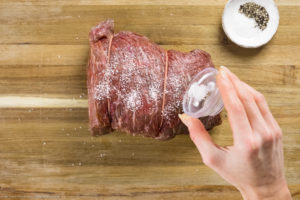
-
Make compound butter: In a medium mixing bowl, combine the butter, minced garlic, chopped rosemary, chopped thyme, 1 teaspoon of kosher salt and 1 teaspoon of cracked black pepper. Use a fork and mix until fully combined. Set aside.
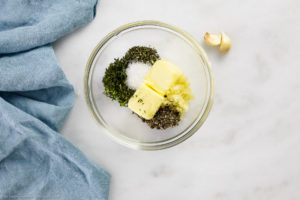
-
Preheat oven: Adjust oven rack to the bottom third position. Preheat oven to 500 degrees F (standard) or 475 degrees F (convection).
-
Dry beef & smear with butter: Once beef is at room temperature, gently pat the beef dry with paper towels. Spread 2 tablespoons of the compound butter evenly over one side of the beef. (Tip: If you have a fat cap on your beef, you want to butter the bottom side. You will flip the beef over so it's roasting with the fat cap facing UP in step 7.)
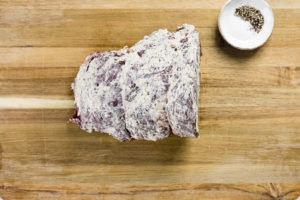
-
Prepare roasting pan: Add the onions, carrots and garlic halves to the bottom of a roasting pan to create a bed.
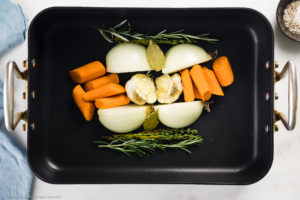
-
Add beef: Place the beef, butter side DOWN on top of the vegetables. Spread 4 tablespoons of the compound butter evenly on top of the beef.
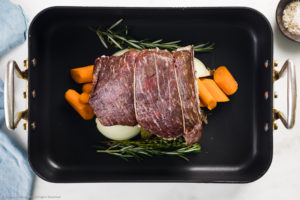
-
Brown: Transfer the roasting pan to the oven and roast for 10 minutes. Remove from oven. REDUCE OVEN TEMPERATURE TO 225 degrees F (standard).
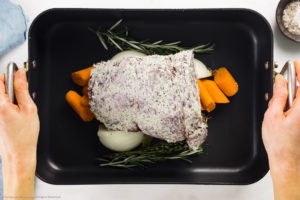
-
Add herbs and remaining butter: Add the sprigs of rosemary and thyme along with the bay leaves to the roasting pan. Carefully spread or dollop the remaining 2 tablespoons of butter evenly on top of the beef. Insert a meat thermometer into the center of the beef.
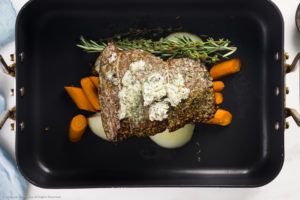
-
Slow Roast: Transfer the roasting pan to the oven. Slow roast the beef for 30 minutes.
-
Season mushrooms: Place the mushrooms in a bowl. Drizzle with 1 tablespoon of olive oil and season with salt and pepper. Toss to coat. Set aside.
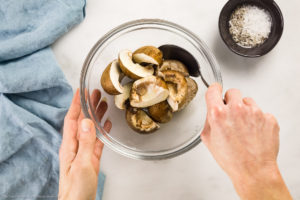
-
Add mushrooms and continue to roast: Remove the roasting pan from the oven and add the mushrooms to the pan, arranging them on the sides of the beef. Return pan to oven and continue to roast for an additional 40 to 60 minutes, or until the internal temperature is 115-118 degrees for medium-rare. (SEE NOTES)
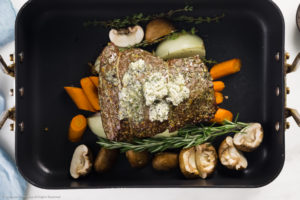
-
Rest: Remove the beef from the roasting pan and transfer to a serving plate or cutting board. Use a slotted spoon remove the mushrooms to a serving bowl. Cover the beef and mushrooms loosely with aluminum foil. Rest for 20+ minutes (the internal temperature of the beef will continue to rise 8-10 minutes during resting).
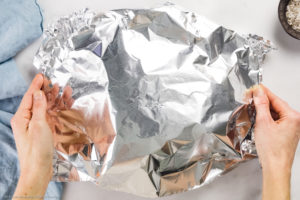
-
Make the gravy: (You should have about 2 tablespoons of fat in the pan. If you don't have a lot of fat, add butter to make up for the lack of drippings.) Remove and discard the onion, garlic and carrots. Place the pan over medium-high heat and add the wine to deglaze, scraping up any brown bits from the bottom of the pan. Bring to a rapid simmer and cook until the wine is reduced by half, about 5 minutes. Add the stock, Worcestershire and season to taste with salt and pepper. Stir to combine and bring the sauce back to a rapid simmer. Simmer for 10 minutes, or until the liquid is reduced by half again. Mix the cornstarch with the water. Slowly drizzle the mixture into the pan while whisking constantly to avoid lumping. Simmer until the sauce is thickened, about 2 minutes. OPTIONAL: Turn the heat to low and stir in heavy cream to taste. Remove from heat and adjust for seasoning with salt and pepper. Transfer the sauce to a gravy boat.
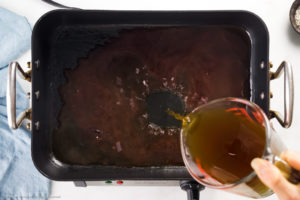
-
Serve: Thinly slice the beef against the grain. Serve with mushrooms and drizzle with gravy. Enjoy!
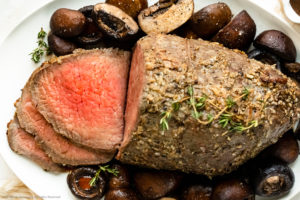
- For the best sear – use a pan instead of the oven: Drizzle the beef with 1 tablespoon of oil and use your hands to rub the oil onto the beef. Season all sides of the beef generously with salt and pepper. Heat a dry roasting pan or large oven-proof cast-iron skillet over medium-high heat. Add the beef to the pan and sear on one side until the bottom becomes golden brown, about 2 minutes. Use tongs to rotate the beef on its side and add 6 tablespoons of the compound butter to the pan. Repeat the process of rotating and searing the beef on all 4 sides, for about 1 ½ - 2 minutes per side, basting the top of the beef with the melted butter from the pan as it sears. Remove the beef from the pan and transfer to a clean work surface. (Skip steps 4-8 of the recipe. Preheat oven to 225 degrees F.)
- Internal Temperature of roast: Internal temperature will rise by about 8-10 degrees F while it's resting. Remove the beef from the oven BEFORE it reaches your desired doneness. I DON'T recommend cooking this roast over medium.
- Rare: 125 degrees. Remove from oven when it's 115-118 degrees.
- Medium Rare: 135. Remove from oven when it's 125-128 degrees.
- Medium: 145. Remove from oven when it's 135-138 degrees.
- Medium Well: 155. Remove from oven when it's 145-148 degrees.
- Well: 165, Remove from oven when it's 155-158 degrees.
- Resting: Resting the beef is important! If you cut into the roast too soon it will lose its juices and become dry. Rest the beef before slicing!
Nutritional information is an approximation based upon 8 servings. Exact information will depend upon the brands of ingredients and precise measurements used.
Calories: 486 kcal | Carbohydrates: 10 g | Protein: 40 g | Fat: 15 g | Saturated Fat: 13 g | Cholesterol: 100 mg | Sodium: 102 mg | Potassium: 1028 mg | Fiber: 1 g | Sugar: 3 g | Vitamin A: 3444 IU | Vitamin C: 7 mg | Calcium: 45 mg | Iron: 1 mg
©No Spoon Necessary. All images and content are under copyright protection. Please do not use any images without prior permission. Please do not publish this recipe without prior consent. To reference this recipe, please link directly to this post.
Source: https://www.nospoonnecessary.com/eye-of-round-roast-beef/